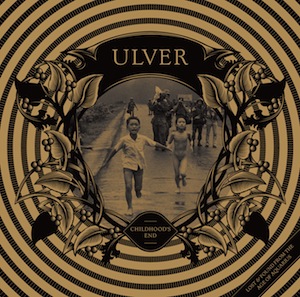
Album Review: Ulver - Childhood's End
I've often wondered how much our experiences color the way we look at the music we love, whether the time in our lives we encounter certain sounds will forever define the impact certain records will have on us. I ponder this because of Ulver's collection of psychedelic covers, “Childhood's End”. Here we have an album of sounds lifted straight from the 60's and 70's scene, where the music served as a soundtrack to acid trips and other forms of mental alteration. Having not grown up in that time, or with those sorts of experiences, the music doesn't bring anything to the table except itself, no nostalgic memories of bygone times to skew my ears.
In that spirit, “Childhood's End” can best be described as both wildly successful, and terribly disappointing. If that sounds confusing, it's because it is, and because so is the experience listening to “Childhood's End”.
It's clear the members of Ulver love the songs they've chosen to reinterpret, but love is a hard thing to translate through sound. The soundscapes of barren emotion and tidal melancholy are foreboding, and set an evocative mood. It's easy to slip into the feeling and lose yourself in the glassy echo of the chords. At the same time, one cannot escape the feeling that the music lives in a different time, that it doesn't belong in this day and age. It's not merely a factor of the changing face of pop music, the very embodiment of these songs is a time and place that no longer exists. The world that gave us this music is no more, turning what could have been nostalgia into a complete anachronism.
That's not to say there isn't anything to be gleaned from listening to “Childhood's End”. While acknowledging the out-of-body experience the music entails, some songs still shine through as worthy compositions. “In The Past” is a driving mix of pop melody with aggressive atmospheric instrumentation that could easily be updated with a modern sound and still be effective. Other songs do not share the same fate, the very heart of the compositions so tied to the psychedelic sound that no fresh take on the music could rescue them from being buried under the sands of time.
What makes an album like “Childhood's End” especially difficult to place judgment on is that so much of it is dependent on artists beyond the band itself. Having not written the songs, assigning both credit and blame is as much an art as a science. To that end, I give Ulver credit for what they've done with these songs, while acknowledging the limits of appropriate praise.
The band has done a masterful job recreating the sounds of the past, from the thin jangle of acoustic guitars, to the wet delay drenching the electrics, to the powerful organs that are always a welcome addition to the mix. The vocals likewise carry the detached sound of the time. Everything sounds vintage, like a love letter to a time the band wishes they could have been a part of.
Whether or not you want to take the trip back in time with Ulver depends on your opinion of all things psychedelic. For those of the right mindset, “Childhood's End” will be a welcome return to better times, a fitting soundtrack to fading memories. For others, it will be an interesting history lesson about a time they will never be understand. In either case, Ulver's craft in reproducing these songs cannot be questioned. They did their job well, regardless of whether you think it needed to be done.

